bowel support for dogs

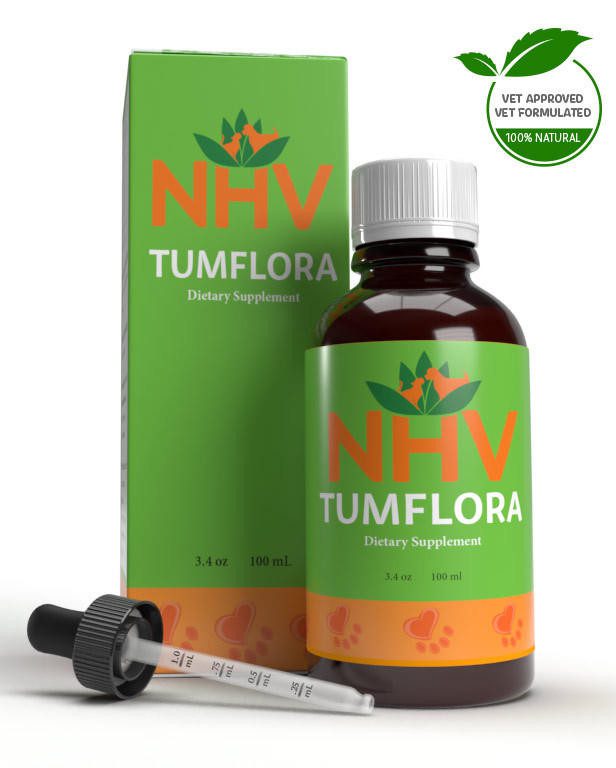
free shipping over $100 (USA & Canada)
1-877-937-4372 the pet expert hotline
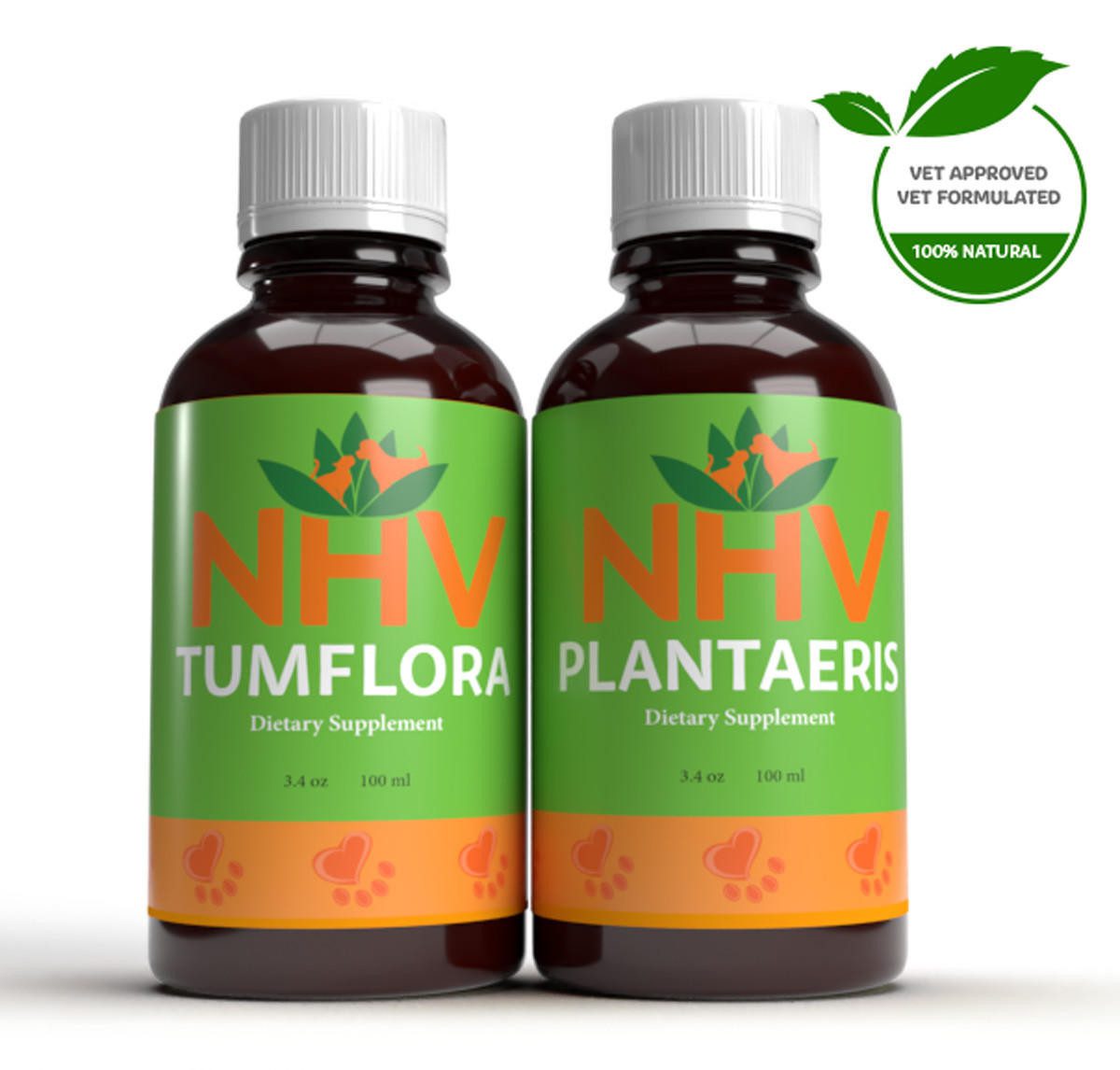
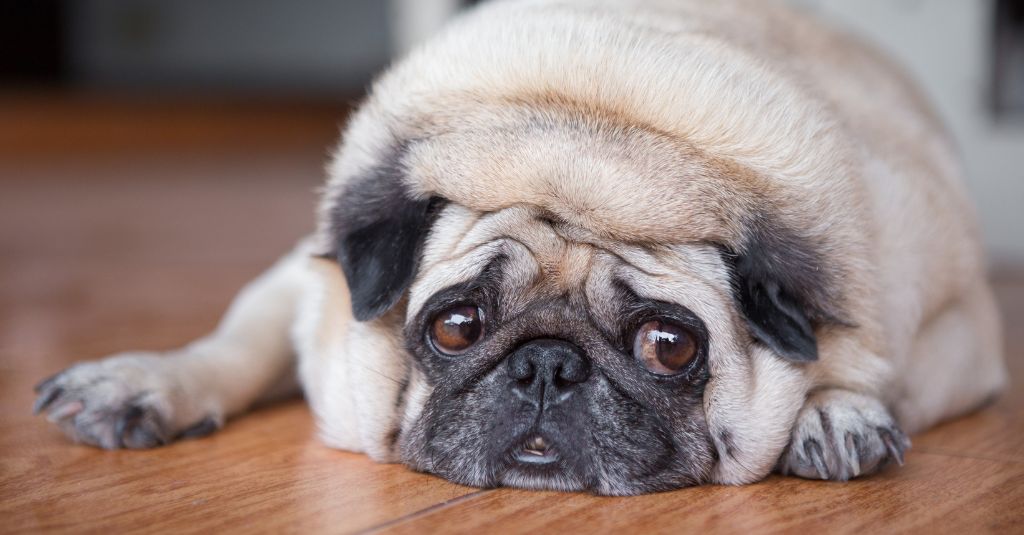
Gas relief for dogs and cats is crucial when tummy trouble is on the horizon. That’s because excessive gas in your little one’s stomach and intestines, a condition known as flatulence, can cause from temporary discomfort to chronic pain. In this article, we’ll explore the causes of flatulence and provide essential diet tips to help ensure a gas-free tummy.
Flatulence is natural, but excessive gas production can be toxic and harmful to your pet’s health.
The production of gases in your little one’s body is normal. This process naturally occurs due to the microbial fermentation of components present in the intestines and results in the formation of various putrefactive compounds, such as ammonia, and gases, such as methane.
Farting is typically more common in dogs and cats two to three hours after their meal. While this gas production is natural, excessive amounts can be toxic, leading to discomfort and potential health issues for our pets. So, what are the signs that your little one’s gas situation has gone out of control? Keep your eyes out for these symptoms:
If you notice any of these signs in your little one, please take them to a vet. They will investigate the root cause by considering clinical signs, medical history, and diagnostic tests, including abdominal ultrasound, intestinal biopsies, blood and urine tests, and fecal examinations.
Gastrointestinal conditions like parasites and chronic bowel diseases can play a role in the production of excessive gas, but more often than not, chronic or excessive flatulence is often linked to dietary factors.
Poorly digested food, high food intake, or a diet with excessive fiber or fat content are some of the common causes of excessive flatulence in pets. When your furry friend is fed any ingredient they are sensitive to, it can also trigger excessive fermentation in their colon, leading to unwanted gas build-up.
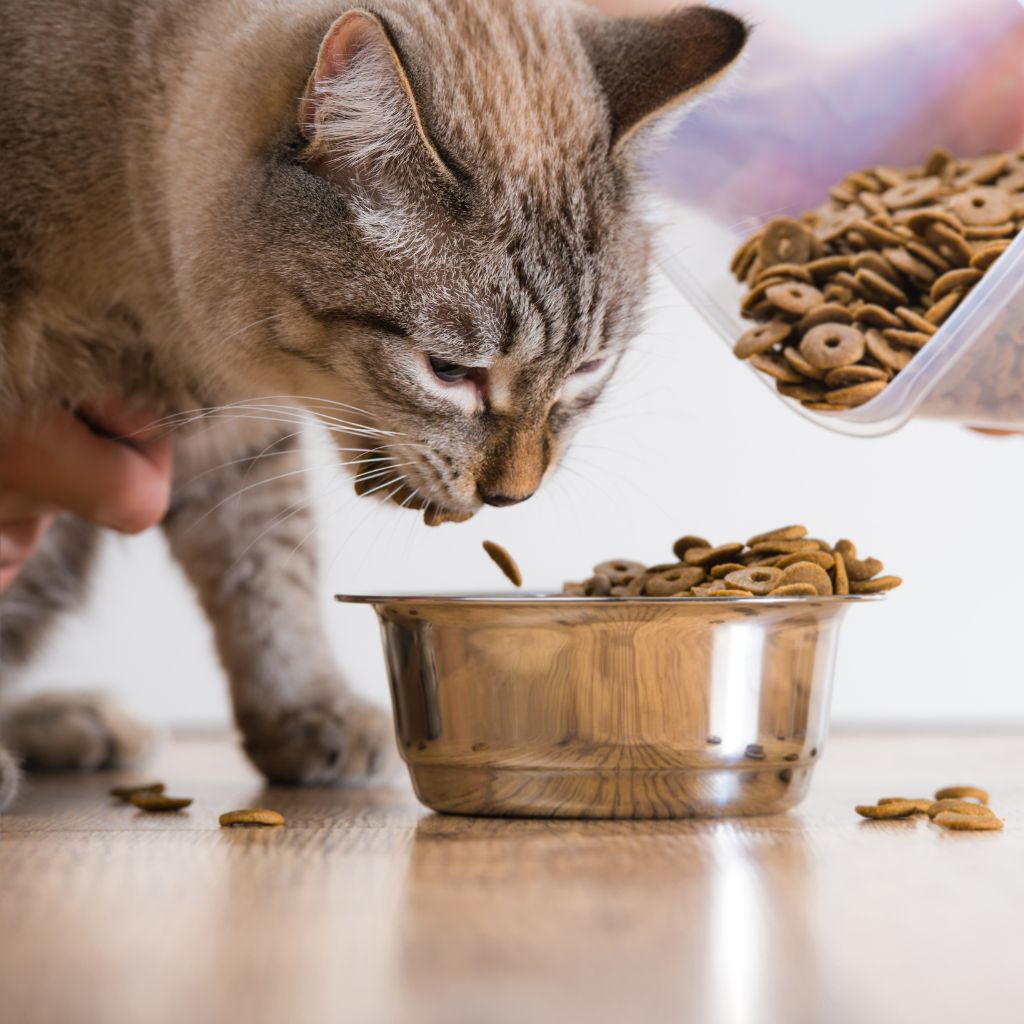
Another common cause of flatulence occurs when dogs or cats eat too quickly, accidentally ingesting excess air. Brachycephalic dog breeds like the English Bulldog, French Bulldog, and Pug are known to produce more pronouncedly smelling poop and experience increased instances of flatulence. This inclination is attributed to their predisposition to ingest larger quantities of air when eating.
Treatment involves addressing underlying causes, which may include a new dietary plan and medications. Your trusted veterinarian may also recommend the following:
In terms of natural supplements for effective gas relief in dogs and cats, our primary recommendation is NHV Plantaeris. This herbal blend offers a natural and gentle solution to address diarrhea and gas. NHV Tumflora is another beneficial option, especially for alleviating symptoms associated with Inflammatory Bowel Disease (IBD), a potential contributor to tummy issues and flatulence. Lastly, NHV Yucca has historically been proven to help promote healthy digestion and reduce discomfort or inflammation in the intestinal tract.
Gas relief for dogs and cats is crucial, given the common yet potentially discomforting issue of flatulence. By understanding the causes and recognizing clinical signs, pet owners and veterinarians can collaborate for effective treatment. Reach out to our team of pet experts if your little one is struggling with digestive health and tummy issues. We are here for you!
bowel support for dogs


Natural Support for Inflammatory Bowel Disease in Cats
buy 2 and save $3
3 month supply for a small to medium size pet.
What is it?
NHV TumFlora can help naturally balance the intestinal flora in your kitty’s body and help maintain a healthy gut. It’s also a great proactive gut supplement for a happy, healthy cat.
How does it work?
Why should I trust it?
NHV supplements have no artificial ingredients - only pure, plant-based goodness.

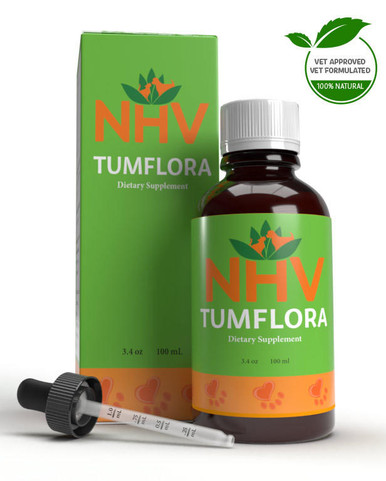
What is it?
NHV TumFlora can help naturally balance the intestinal flora in your kitty’s body and help maintain a healthy gut. It’s also a great proactive gut supplement for a happy, healthy cat.
How does it work?
Why should I trust it?
NHV supplements have no artificial ingredients - only pure, plant-based goodness.

If your kitty’s fur is looking dull, they won’t eat their favorite treats and are suffering from vomiting, weight loss, diarrhea, and lethargy, your sweet kitty may have Inflammatory Bowel Disease (IBD in cats).
Inflammatory Bowel Disease in cats (IBD) is a condition that mainly affects middle-aged to senior kitties, though it can occur at any age. IBD in cats is caused by an inflammatory response to an irritated and inflamed GI tract.
How TumFlora Supports Inflammatory Bowel Disease in Cats
The exact causes of IBD in cats are unknown, however, evidence does suggest that it may arise from an abnormal interaction between bacterial populations in the intestines, diet, a compromised immune system, and other environmental factors as well as genetic abnormalities. TumFlora helps support the body on a variety of levels, which helps address this complex problem.
To help address the imbalance of bacterial populations in the intestines, TumFlora’s blend of herbs work to improve natural intestinal flora. Herbs like licorice and ashwagandha offer support for the immune system, while vitamin and mineral dense herbs like slippery elm and oregon grape help improve nutrient absorption.
In addition to helping with IBD in cats, TumFlora can also help support your kitty if they are suffering from food allergies, gastrointestinal ulcers, and bacterial infections of the gut. Don’t wait for your kitty to have IBD for adding TumFlora, this gentle supplement can be used on a long term proactive basis to support your pet’s gut health.
Inflammatory response thickens the lining of the GI tract, which ends up affecting digestion, absorption of nutrients, and healthy bathroom habits. Cats with Irritable Bowel Disease can experience the following symptoms:
Symptoms of Inflammatory Bowel Disease in Cats
Your veterinarian may recommend treatment for intestinal parasites as well as a combination of medications and diet therapy as a first step. A novel protein, like rabbit or duck, may also be recommended. It takes time and your veterinarian may need to try several different therapies and medications. For a personalized veterinary nutrition plan for your little one, click here.
At NHV, we are a team of holistic veterinarians, pet experts and animal enthusiasts. Get in touch with us if you have any questions or concerns about your pup’s GI tract health or need some extra support.
Made with the finest, organically grown, or ethically harvested herbs. Made specifically for pets, vet-formulated, and vet approved.
Ashwagandha also known as Indian ginseng, is a root that contains a range of beneficial properties including anti-stress and anti-inflammatory action. It also helps defend against microorganisms and balances the immune system.
Boswellia has powerful anti-inflammatory properties and has been used in traditional herbal medicine to treat inflammatory bowel disease.
Chamomile has traditionally been used to help relieve indigestion, expel gas, ease nervous spasms, improve bile flow, and relieve vomiting due to inflammatory bowel disease in cats.
Fennel is an anti-inflammatory, nutritive herb that helps against microorganisms and soothes digestive upset, expels intestinal gas, and relaxes stomach cramps or spasms.
Indian Gooseberry is prized in Ayurvedic medicine for its many health benefits. It may help regulate cholesterol levels, and soothe nausea.
Licorice has been used for centuries for its immunostimulant and anti-inflammatory properties to support against microorganisms, digestion and general well-being. It contains free radical scavengers to help promote healing.
Marshmallow contains demulcent, and diuretic properties. It helps defend against microorganisms, controls bacterial infection, protects the intestinal mucosa, and soothes inflamed mucosa. It has been used in herbalism as a treatment for gastroenteritis.
Oregon Grape contains anti-inflammatory, anti-bacterial, and anti-fungal properties with strong affinities to the liver, digestive system, and mucous membranes.
Slippery Elm contains anti-inflammatory properties and is rich in vitamins and minerals. It is beneficial for gastritis, colitis, duodenal ulcers, and diarrhea.
Select your pet's weight to determine the correct dose.
To be taken twice daily. Determine your pet’s weight and then use the easy chart below to determine the correct dose. This is the minimum dosage.
Pet's Weight Dosage
0 - 15 lb = 0.5 ml
16 - 30 lb = 1.0 ml
31 - 45 lb = 1.5 ml
46 - 60 lb = 2.0 ml
61 - 75 lb = 2.5 ml
Over 75 lb = 3.0 ml
How to Administer
Shake well before use. The easiest method is to use the dropper provide and places the drops into your pet’s food or favorite treat. You can also use the dropper and squirt directly into the pet’s mouth.
Some pets can be finicky, if this occurs consider hiding the drops in foods most pet’s love such as fish, chicken or yogurt or a favorite treat. If your pet only eats dry food then soak a few kibbles at feeding time.
For Best Results
Herbal dietary supplements are beneficial to the health and wellbeing of your pet and are safe for long-term use. Every pet responds to natural herbal supplements differently, therefore it is important to be consistent and administer the product daily. Supplements generally take two to four weeks to take effect, however this will vary from one animal to the next.
Product Storage
All NHV Natural Pet Products are pure herbal extracts and contain no artificial additives, preservatives or coloring. Shelf life after opening is 6 months and must be refrigerated after opening.
Cautions and Contraindications: Do not use TumFlora in pregnant or nursing animals. Speak to your vet before using our products. A second visit is recommended if your pet’s condition does not improve, or deteriorates after continued use of the supplements.
If your kitty’s fur is looking dull, they won’t eat their favorite treats and are suffering from vomiting, weight loss, diarrhea, and lethargy, your sweet kitty may have Inflammatory Bowel Disease (IBD in cats).
Inflammatory Bowel Disease in cats (IBD) is a condition that mainly affects middle-aged to senior kitties, though it can occur at any age. IBD in cats is caused by an inflammatory response to an irritated and inflamed GI tract.
How TumFlora Supports Inflammatory Bowel Disease in Cats
The exact causes of IBD in cats are unknown, however, evidence does suggest that it may arise from an abnormal interaction between bacterial populations in the intestines, diet, a compromised immune system, and other environmental factors as well as genetic abnormalities. TumFlora helps support the body on a variety of levels, which helps address this complex problem.
To help address the imbalance of bacterial populations in the intestines, TumFlora’s blend of herbs work to improve natural intestinal flora. Herbs like licorice and ashwagandha offer support for the immune system, while vitamin and mineral dense herbs like slippery elm and oregon grape help improve nutrient absorption.
In addition to helping with IBD in cats, TumFlora can also help support your kitty if they are suffering from food allergies, gastrointestinal ulcers, and bacterial infections of the gut. Don’t wait for your kitty to have IBD for adding TumFlora, this gentle supplement can be used on a long term proactive basis to support your pet’s gut health.
Inflammatory response thickens the lining of the GI tract, which ends up affecting digestion, absorption of nutrients, and healthy bathroom habits. Cats with Irritable Bowel Disease can experience the following symptoms:
Symptoms of Inflammatory Bowel Disease in Cats
Your veterinarian may recommend treatment for intestinal parasites as well as a combination of medications and diet therapy as a first step. A novel protein, like rabbit or duck, may also be recommended. It takes time and your veterinarian may need to try several different therapies and medications. For a personalized veterinary nutrition plan for your little one, click here.
At NHV, we are a team of holistic veterinarians, pet experts and animal enthusiasts. Get in touch with us if you have any questions or concerns about your pup’s GI tract health or need some extra support.
Made with the finest, organically grown, or ethically harvested herbs. Made specifically for pets, vet-formulated, and vet approved.
Ashwagandha also known as Indian ginseng, is a root that contains a range of beneficial properties including anti-stress and anti-inflammatory action. It also helps defend against microorganisms and balances the immune system.
Boswellia has powerful anti-inflammatory properties and has been used in traditional herbal medicine to treat inflammatory bowel disease.
Chamomile has traditionally been used to help relieve indigestion, expel gas, ease nervous spasms, improve bile flow, and relieve vomiting due to inflammatory bowel disease in cats.
Fennel is an anti-inflammatory, nutritive herb that helps against microorganisms and soothes digestive upset, expels intestinal gas, and relaxes stomach cramps or spasms.
Indian Gooseberry is prized in Ayurvedic medicine for its many health benefits. It may help regulate cholesterol levels, and soothe nausea.
Licorice has been used for centuries for its immunostimulant and anti-inflammatory properties to support against microorganisms, digestion and general well-being. It contains free radical scavengers to help promote healing.
Marshmallow contains demulcent, and diuretic properties. It helps defend against microorganisms, controls bacterial infection, protects the intestinal mucosa, and soothes inflamed mucosa. It has been used in herbalism as a treatment for gastroenteritis.
Oregon Grape contains anti-inflammatory, anti-bacterial, and anti-fungal properties with strong affinities to the liver, digestive system, and mucous membranes.
Slippery Elm contains anti-inflammatory properties and is rich in vitamins and minerals. It is beneficial for gastritis, colitis, duodenal ulcers, and diarrhea.
Select your pet's weight to determine the correct dose.
To be taken twice daily. Determine your pet’s weight and then use the easy chart below to determine the correct dose. This is the minimum dosage.
Pet's Weight Dosage
0 - 15 lb = 0.5 ml
16 - 30 lb = 1.0 ml
31 - 45 lb = 1.5 ml
46 - 60 lb = 2.0 ml
61 - 75 lb = 2.5 ml
Over 75 lb = 3.0 ml
How to Administer
Shake well before use. The easiest method is to use the dropper provide and places the drops into your pet’s food or favorite treat. You can also use the dropper and squirt directly into the pet’s mouth.
Some pets can be finicky, if this occurs consider hiding the drops in foods most pet’s love such as fish, chicken or yogurt or a favorite treat. If your pet only eats dry food then soak a few kibbles at feeding time.
For Best Results
Herbal dietary supplements are beneficial to the health and wellbeing of your pet and are safe for long-term use. Every pet responds to natural herbal supplements differently, therefore it is important to be consistent and administer the product daily. Supplements generally take two to four weeks to take effect, however this will vary from one animal to the next.
Product Storage
All NHV Natural Pet Products are pure herbal extracts and contain no artificial additives, preservatives or coloring. Shelf life after opening is 6 months and must be refrigerated after opening.
Cautions and Contraindications: Do not use TumFlora in pregnant or nursing animals. Speak to your vet before using our products. A second visit is recommended if your pet’s condition does not improve, or deteriorates after continued use of the supplements.
discomfort support
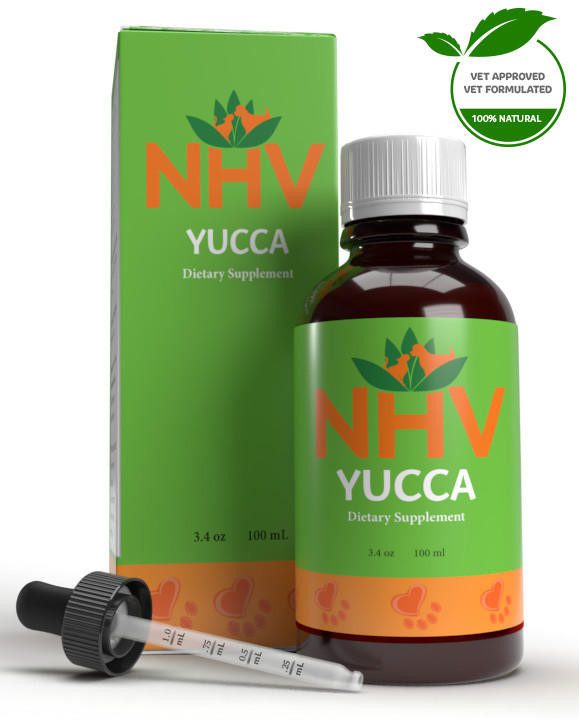
Discomfort Relief, Digestive Support, and Dog Appetite Booster
buy 2 and save $3
3 month supply for a small to medium size
What is it?
Yucca for dogs is an all-natural supplement that can be helpful in many circumstances by providing symptom relief related to inflammation, discomfort, and loss of appetite.
How does it work?
Why trust it?
NHV uses only human-grade herbs processed in a GMP-certified facility, so your pet gets the best natural support.


What is it?
Yucca for dogs is an all-natural supplement that can be helpful in many circumstances by providing symptom relief related to inflammation, discomfort, and loss of appetite.
How does it work?
Why trust it?
NHV uses only human-grade herbs processed in a GMP-certified facility, so your pet gets the best natural support.

Yucca root is widely used in dog food as well as in other pet foods. It is an herb that is highly nutritive as it is rich in vitamin C, beta-carotene, B vitamins, magnesium, iron, calcium, manganese, protein, niacin, and phosphorus. Yucca contains two very beneficial compounds: sarsasapogenin and smilagenin. These two compounds work on the mucous membranes of the small intestine. These compounds help with the penetration and absorption of minerals and vitamins. Sarsasapogenin and Smilagenin are known as steroidal saponins (phytosterols), which act as precursors to corticosteroids produced naturally by the body.
Steroidal-saponins support the immune function of the body while stimulating and supporting the production of its own corticosteroids and corticosteroid–related hormones. Due to this action, studies conducted on yucca have shown that it may be beneficial and effective for discomfort and inflammation in conditions such as arthritis. Yucca may also be effective as an appetite booster in dogs and may also help reduce the production of urease, which contributes to the unpleasant odors of urine and feces in some dogs.
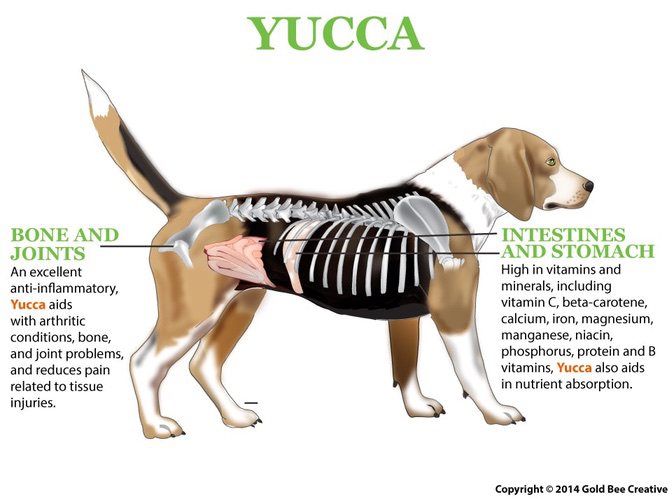
Yucca for dogs is commonly used for supporting arthritis, as an anti-inflammatory, nutritive, antitumor, and digestive. Yucca for dogs is considered a nutritive herb because it is rich in vitamins and minerals like vitamin C, beta-carotene, B vitamins, magnesium, iron, calcium, manganese, protein, niacin, and phosphorus.
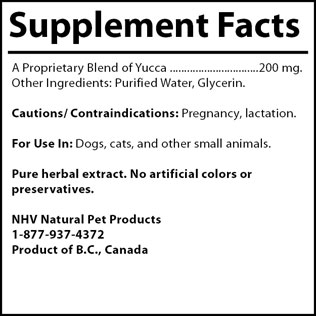
Select your pet's weight to determine the correct dose.
To be taken twice daily. Determine your pet’s weight and then use the easy chart below to determine the correct dose. This is the minimum dosage.
Pet's Weight Dosage
0 - 15 lb = 0.5 ml
16 - 30 lb = 1.0 ml
31 - 45 lb = 1.5 ml
46 - 60 lb = 2.0 ml
61 - 75 lb = 2.5 ml
Over 75 lb = 3.0 ml
How to Administer: Shake well before use. The easiest method is to use the dropper provided and place the drops into your pet’s food or favorite treat. You can also use the dropper and squirt directly into the pet’s mouth. Some pets can be finicky, if this occurs consider hiding the drops in foods most pet’s love such as fish, chicken or yogurt or a favorite treat. If your pet only eats dry food then soak a few kibbles at feeding time.
For Best Results: Herbal dietary supplements are beneficial to the health and well-being of your pet and are safe for long-term use. Every pet responds to natural herbal supplements differently, therefore it is important to be consistent and administer the product daily. Supplements generally take two to four weeks to take effect, however this will vary from one animal to the next.
Product Storage: All NHV Natural Pet Products are pure herbal extracts and contain no artificial additives, preservatives or coloring. Shelf life after opening is 6 months and must be refrigerated after opening.
Cautions and Contraindications: Do not use Yucca in pregnant or nursing animals. Speak to your vet before using our products. A second visit is recommended if your pet’s condition does not improve, or deteriorates after continued use of the supplements. All information provided by NHV Natural Pet Products is for educational purposes only.
Yucca root is widely used in dog food as well as in other pet foods. It is an herb that is highly nutritive as it is rich in vitamin C, beta-carotene, B vitamins, magnesium, iron, calcium, manganese, protein, niacin, and phosphorus. Yucca contains two very beneficial compounds: sarsasapogenin and smilagenin. These two compounds work on the mucous membranes of the small intestine. These compounds help with the penetration and absorption of minerals and vitamins. Sarsasapogenin and Smilagenin are known as steroidal saponins (phytosterols), which act as precursors to corticosteroids produced naturally by the body.
Steroidal-saponins support the immune function of the body while stimulating and supporting the production of its own corticosteroids and corticosteroid–related hormones. Due to this action, studies conducted on yucca have shown that it may be beneficial and effective for discomfort and inflammation in conditions such as arthritis. Yucca may also be effective as an appetite booster in dogs and may also help reduce the production of urease, which contributes to the unpleasant odors of urine and feces in some dogs.

Yucca for dogs is commonly used for supporting arthritis, as an anti-inflammatory, nutritive, antitumor, and digestive. Yucca for dogs is considered a nutritive herb because it is rich in vitamins and minerals like vitamin C, beta-carotene, B vitamins, magnesium, iron, calcium, manganese, protein, niacin, and phosphorus.

Select your pet's weight to determine the correct dose.
To be taken twice daily. Determine your pet’s weight and then use the easy chart below to determine the correct dose. This is the minimum dosage.
Pet's Weight Dosage
0 - 15 lb = 0.5 ml
16 - 30 lb = 1.0 ml
31 - 45 lb = 1.5 ml
46 - 60 lb = 2.0 ml
61 - 75 lb = 2.5 ml
Over 75 lb = 3.0 ml
How to Administer: Shake well before use. The easiest method is to use the dropper provided and place the drops into your pet’s food or favorite treat. You can also use the dropper and squirt directly into the pet’s mouth. Some pets can be finicky, if this occurs consider hiding the drops in foods most pet’s love such as fish, chicken or yogurt or a favorite treat. If your pet only eats dry food then soak a few kibbles at feeding time.
For Best Results: Herbal dietary supplements are beneficial to the health and well-being of your pet and are safe for long-term use. Every pet responds to natural herbal supplements differently, therefore it is important to be consistent and administer the product daily. Supplements generally take two to four weeks to take effect, however this will vary from one animal to the next.
Product Storage: All NHV Natural Pet Products are pure herbal extracts and contain no artificial additives, preservatives or coloring. Shelf life after opening is 6 months and must be refrigerated after opening.
Cautions and Contraindications: Do not use Yucca in pregnant or nursing animals. Speak to your vet before using our products. A second visit is recommended if your pet’s condition does not improve, or deteriorates after continued use of the supplements. All information provided by NHV Natural Pet Products is for educational purposes only.
digestive support
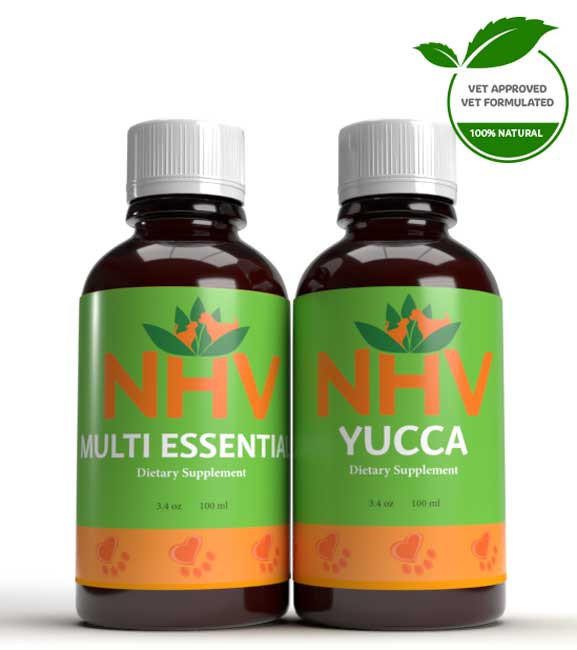
Yucca & Multi Essentials
bundle and save with pet expert kits
3 month supply for a small to medium size pet.
What is it?
NHV’s Digestion Kit is a comprehensive bundle that helps to soothe inflammation, encourage better absorption, and stimulate metabolism.
How Does it Work?
Why Should I Trust It?
Made with the finest, organically grown, or ethically harvested herbs.

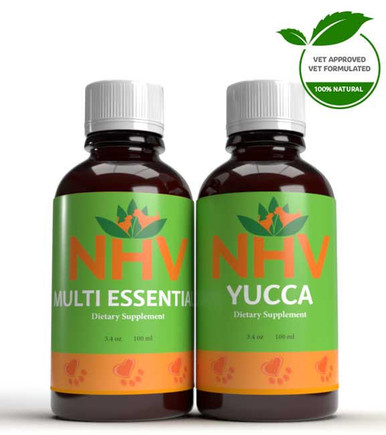
What is it?
NHV’s Digestion Kit is a comprehensive bundle that helps to soothe inflammation, encourage better absorption, and stimulate metabolism.
How Does it Work?
Why Should I Trust It?
Made with the finest, organically grown, or ethically harvested herbs.

Regardless of your furkiddo’s age, it’s never easy to see them slowing down and having difficulties with their health. If your furry friend is having a tough time with their digestion, then they may not be able to break down and absorb all of the nutrients necessary for maintaining healthy skin, fur and overall health. Our Digestion Kit is formulated to help fill nutritional voids, improve absorption and overall gastrointestinal health.
Just like humans, as our pets age, they may be a little less energetic. That's totally normal! We all require different levels of support at different stages in our lives. Our Digestion Kit contains Yucca, and Multi Essentials, which is a supplement bundle designed to help our pets better absorb nutrients and trigger metabolism. Yucca contains a high level of antioxidant properties that are beneficial for promoting healthy appetite and improving absorption. When it comes to cat sensitive stomach and gastrointestinal dog care, the herbs in Multi Essentials provide many key vitamins and minerals for building and maintaining healthy GI tract health, promoting healthy metabolism, and helping to reduce fatigue. Ingredients like chickweed and dandelion are effective digestive tonics that may help to enhance absorption while herbs like Oregon grape help to reduce indigestion and malabsorption.
It’s great to know that there are ways to support your furkiddo’s digestion naturally! Other than adding natural supports to their daily meals, if you’re wondering about options for gastrointestinal dog care and cat care, a personalized diet for your pet, created by Dr. Amanda, is another great way to support your furry friend!
Made with the finest, organically grown, or ethically harvested herbs. Made specifically for pets, vet-formulated, and vet approved.
Multi Essentials
Select your pet's weight to determine the correct dose.
To be taken twice daily. Determine your pet’s weight and then use the easy chart below to determine the correct dose. This is the minimum dosage.
Pet's Weight Dosage
0 - 15 lb = 0.5 ml
16 - 30 lb = 1.0 ml
31 - 45 lb = 1.5 ml
46 - 60 lb = 2.0 ml
61 - 75 lb = 2.5 ml
Over 75 lb = 3.0 ml
How to Administer
Shake well before use. The easiest method is to use the dropper provided and place the drops into your pet’s food or favorite treat. You can also use the dropper and squirt directly into the pet’s mouth. Some pets can be finicky, if this occurs consider hiding the drops in foods most pet’s love such as fish, chicken or yogurt or a favorite treat. If your pet only eats dry food then soak a few kibbles at feeding time.
For Best Results
Herbal dietary supplements are beneficial to the health and well-being of your pet and are safe for long-term use. Every pet responds to natural herbal supplements differently, therefore it is important to be consistent and administer the product daily. Supplements generally take two to four weeks to take effect, however this will vary from one animal to the next.
Product Storage
All NHV Natural Pet Products are pure herbal extracts and contain no artificial additives, preservatives or coloring. Shelf life after opening is 6 months and must be refrigerated after opening.
All information provided by NHV Natural Pet Products is for educational purposes only.
Regardless of your furkiddo’s age, it’s never easy to see them slowing down and having difficulties with their health. If your furry friend is having a tough time with their digestion, then they may not be able to break down and absorb all of the nutrients necessary for maintaining healthy skin, fur and overall health. Our Digestion Kit is formulated to help fill nutritional voids, improve absorption and overall gastrointestinal health.
Just like humans, as our pets age, they may be a little less energetic. That's totally normal! We all require different levels of support at different stages in our lives. Our Digestion Kit contains Yucca, and Multi Essentials, which is a supplement bundle designed to help our pets better absorb nutrients and trigger metabolism. Yucca contains a high level of antioxidant properties that are beneficial for promoting healthy appetite and improving absorption. When it comes to cat sensitive stomach and gastrointestinal dog care, the herbs in Multi Essentials provide many key vitamins and minerals for building and maintaining healthy GI tract health, promoting healthy metabolism, and helping to reduce fatigue. Ingredients like chickweed and dandelion are effective digestive tonics that may help to enhance absorption while herbs like Oregon grape help to reduce indigestion and malabsorption.
It’s great to know that there are ways to support your furkiddo’s digestion naturally! Other than adding natural supports to their daily meals, if you’re wondering about options for gastrointestinal dog care and cat care, a personalized diet for your pet, created by Dr. Amanda, is another great way to support your furry friend!
Made with the finest, organically grown, or ethically harvested herbs. Made specifically for pets, vet-formulated, and vet approved.
Multi Essentials
Select your pet's weight to determine the correct dose.
To be taken twice daily. Determine your pet’s weight and then use the easy chart below to determine the correct dose. This is the minimum dosage.
Pet's Weight Dosage
0 - 15 lb = 0.5 ml
16 - 30 lb = 1.0 ml
31 - 45 lb = 1.5 ml
46 - 60 lb = 2.0 ml
61 - 75 lb = 2.5 ml
Over 75 lb = 3.0 ml
How to Administer
Shake well before use. The easiest method is to use the dropper provided and place the drops into your pet’s food or favorite treat. You can also use the dropper and squirt directly into the pet’s mouth. Some pets can be finicky, if this occurs consider hiding the drops in foods most pet’s love such as fish, chicken or yogurt or a favorite treat. If your pet only eats dry food then soak a few kibbles at feeding time.
For Best Results
Herbal dietary supplements are beneficial to the health and well-being of your pet and are safe for long-term use. Every pet responds to natural herbal supplements differently, therefore it is important to be consistent and administer the product daily. Supplements generally take two to four weeks to take effect, however this will vary from one animal to the next.
Product Storage
All NHV Natural Pet Products are pure herbal extracts and contain no artificial additives, preservatives or coloring. Shelf life after opening is 6 months and must be refrigerated after opening.
All information provided by NHV Natural Pet Products is for educational purposes only.
Published: November 15, 2023